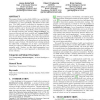Free Online Productivity Tools
i2Speak
i2Symbol
i2OCR
iTex2Img
iWeb2Print
iWeb2Shot
i2Type
iPdf2Split
iPdf2Merge
i2Bopomofo
i2Arabic
i2Style
i2Image
i2PDF
iLatex2Rtf
Sci2ools
102
click to vote
ATAL
2008
Springer
2008
Springer
Multi-robot Markov random fields
We propose Markov random fields (MRFs) as a probabilistic mathematical model for unifying approaches to multi-robot coordination or, more specifically, distributed action selection. The MRF model is well-suited to domains in which the joint probability over latent (action) and observed (perceived) variables can be factored into pairwise interactions between these variables. Specifically, these interactions occur through functions that evaluate "local evidence" between an observed and latent variable and"compatibility" between a pair of latent variables. For multi-robot coordination, we cast local evidence functions as the computation for an individual robot's action selection from its local observations and compatibility as the dependence in action selection between a pair of robots. We describe how existing methods for multi-robot coordination (or at least a non-exhaustive subset) fit within an MRF-based model and how they conceptually unify. Further, we offe...
Action Selection | ATAL 2008 | Intelligent Agents | Markov Random Field | Multi-robot Coordination |
Related Content
| Added | 12 Oct 2010 |
| Updated | 12 Oct 2010 |
| Type | Conference |
| Year | 2008 |
| Where | ATAL |
| Authors | Jesse Butterfield, Odest Chadwicke Jenkins, Brian P. Gerkey |
Comments (0)

